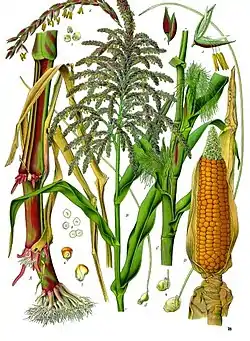кукуруз
Bashkir

Etymology
From Ottoman Turkish قوقوروز (kukuruz), perhaps via Russian кукуру́за (kukurúza).
Pronunciation
- IPA(key): [ku.ku.ˈruz]
- Hyphenation: ку‧ку‧руз
Declension
| singular only | |
|---|---|
| absolute | кукуруз (kukuruz) |
| definite genitive | кукуруз (kukuruz) |
| dative | кукуруз (kukuruz) |
| definite accusative | кукуруз (kukuruz) |
| locative | кукуруз (kukuruz) |
| ablative | кукуруз (kukuruz) |
Russian
Pronunciation
- IPA(key): [kʊkʊˈrus]
Serbo-Croatian
Etymology
Cognate with Russian кукуру́за (kukurúza), Ukrainian кукуру́(д)з (kukurú(d)z), кукуру́(д)за (kukurú(d)za), Bulgarian кукуру́з (kukurúz), кукума́ра (kukumára), кукура́тка (kukurátka), Slovene kukuruza, kukorica, koruza, Polish kukurudza, kukurydza. German Kukuruz was borrowed from Slavic. A difficult word to ascertain the ultimate origin of.
The suggestion of a Slavic origin and a relationship to Serbo-Croatian kukurek (“hellebore”) and Bulgarian кукуря́к (kukurják, “hellebore”), Slovene kukurjav, kukurjast (“curled”) does not explain the word-form difficulties (-dz-). Compare Bulgarian момору́з (momorúz), моморо́з (momoróz, “corn, maize”), мамалига (mamaliga, “hominy”).
If the source were Romanian cucuruz, it should have originally had the meaning of "pine cones".
A noteworthy hypothesis for the source of "kukuru" is a word used for calling poultry for their feeding (with corn/maize).
The explanation that the term is borrowed from Ottoman Turkish قوقوروز (kokoroz), ultimately from Albanian kokërrëz, from kokërr,[1] remains frequently cited, but derivation from Turkic kokoros (“corn, maize”) was refuted by F. Miklošič and F. E. Korsch.
Pronunciation
- IPA(key): /kukǔruz/
- Hyphenation: ку‧ку‧руз